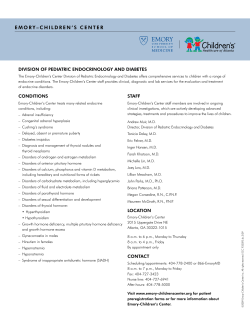
FAQ: Thyroid Hormone Treatment What is the thyroid gland?
FAQ:Thyroid Hormone Treatment This page and its contents are Copyright © 2012 the American Thyroid Association What is the thyroid gland? The thyroid gland located in the neck produces thyroid hormones which help the body use energy, stay warm and keep the brain, heart, muscles, and other organs working normally. Thyroid hormone is used: 1) to replace the function of a failing, or failed, thyroid gland (replacement therapy), and 2) to prevent further growth of thyroid tissue (suppression therapy), particularly in patients with a history of thyroid cancer Why do I need thyroid hormone pills? Hypothyroidism is the most common reason for needing thyroid hormone replacement (see Hypothyroidism brochure). Pure synthetic thyroxine (T4), taken once daily by mouth, successfully treats the symptoms of hypothyroidism in most patients. T4 to T3 is normal in hypothyroid patients, so the body can regulate to levels of T4 just as if the T4 was being produced from the thyroid gland. T3 has a very short life span in the body, while the life span of T4 is much longer, ensuring a steady supply of T3. There is no indication for the use of T3 alone for the treatment of hypothyroidism. How is the dose of thyroxine chosen? What about combined T4 and T3 treatment? The initial T4 dose is carefully selected based on your weight, age, and other medical conditions. The dose is then adjusted based on your thyroid hormone levels and your symptoms. The current branded forms of T4 are Synthroid® Levoxyl® Levothyroid®, Tirosint® and Unithroid®. Although these all contain the same synthetic T4, there are different inert ingredients in each of brand names. In general, it is best for you to stay on the same brand name. There has been interest in whether addition of a low amount of T3 given twice or three times a day in combination with T4 may benefit those patients that do not feel completely normal on T4 alone. A trial period of 3 – 6 months is reasonable to determine if combination T4 and T3 therapy will help. How do I take thyroxine? Will thyroid hormone help me if I have hypothyroid symptoms but normal thyroid hormone levels? In several scientific studies, there was no difference between T4 and a placebo (sugar pill) in improving symptoms, depression or well-being in patients with “hypothyroid” symptoms and normal thyroid hormone levels. T4 is taken just once a day and results in very stable levels of thyroid hormone in the blood stream. The best time to take T4 is probably first thing in the morning on an empty stomach. However, the most important thing is to be consistent when you take it. If you miss a dose of T4, it is usually best to take the missed dose as soon as you remember. Does thyroxine interact with any other medications? Medications that may cause a change in your T4 dose include birth control pills, estrogen, testosterone, some anti-seizure medications, and some medications for depression. Iron, calcium, soy, and some cholesterol-lowering medications can decrease the absorption of thyroid hormone. Should I take thyroxine while I am pregnant? Since T4 is a hormone normally present in the body, it is absolutely safe to take it while pregnant. You often need an increased dose of T4 during pregnancy, so it is important to have thyroid hormone and TSH levels measured once you know that you are pregnant. What about “natural” thyroid hormones? Desiccated (dried and powdered) animal thyroid (Armour®), now mainly obtained from pigs, was the most common form of thyroid therapy before the individual active thyroid hormones were discovered. While desiccated thyroid contains both T4 and T3, the balance of T4 and T3 in animals is not the same as in humans, so the hormones in animal thyroid pills aren’t necessarily “natural” for the human body. Further, the amounts of both T4 and T3 can vary in every batch of desiccated thyroid, making it harder to keep blood levels right. Finally, even dessicated thyroid pills have chemicals (binders) in them to hold the pill together, so they are not completely “natural”. Desiccated animal thyroid is rarely prescribed today, and there is no evidence that desiccated thyroid has any advantage over synthetic T4. What about T3? While most actions of thyroid hormone are most likely due to T3, most T3 in the body comes from the conversion of T4. The conversion of Why would I need to go on thyroid hormone suppression therapy? Thyroxine can also be used to keep the TSH level in the low, or low normal, range. In the past, such thyroid hormone suppression therapy was used to prevent benign thyroid nodules and enlarged thyroid glands from growing. More recent evidence has shown that this practice is not effective in regions of the world that have adequate iodine intake (such as the USA). Moreover, excess thyroid hormone can increase the risk or heart rhythm problems and bone loss making the use of thyroxine for suppressing benign thyroid tissue more risky than beneficial in iodine sufficient populations. Thyroid hormone suppression therapy is also an important part of the treatment of thyroid cancer and is effective in stopping the growth of microscopic thyroid cancer cells or residual thyroid cancer. In this case, the benefit of suppression therapy outweighs the risks. Where can I find additional information? Further details on this and other thyroid-related topics are available in the patient information section on the American Thyroid Association website at www.thyroid.org.
© Copyright 2025





















